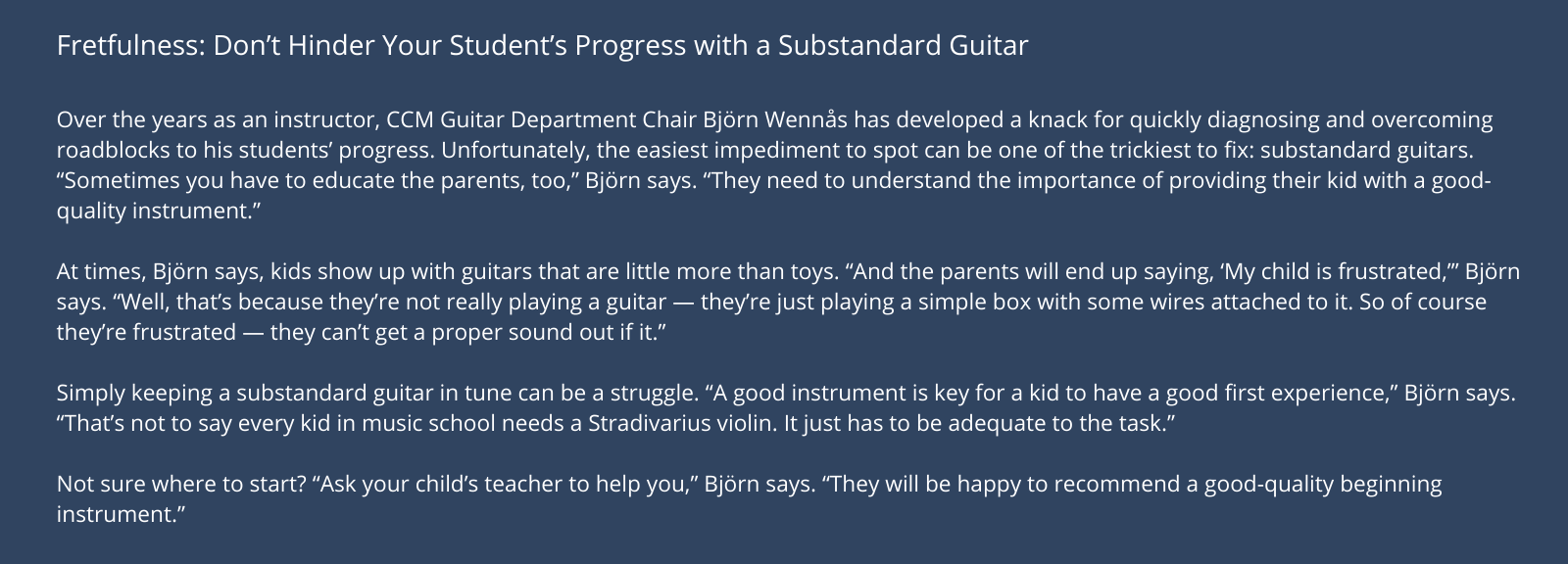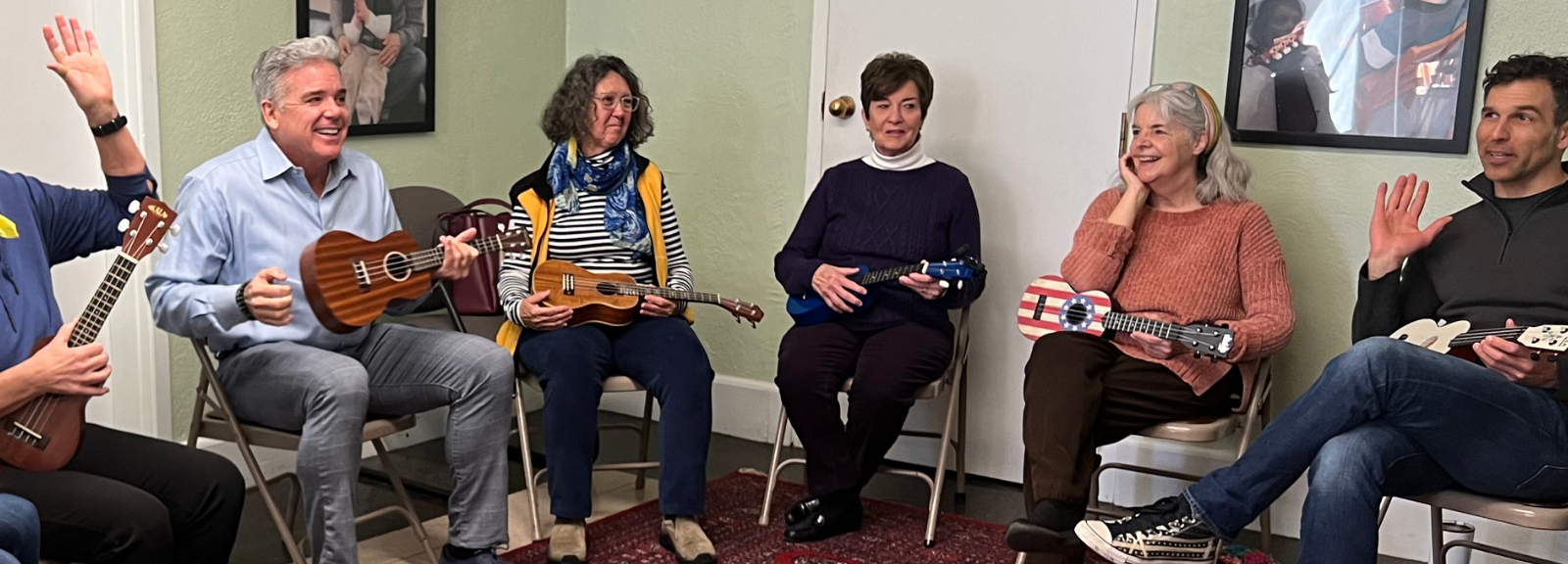
CCM on the Local News!
On Tuesday, March 8th, WCVB Newscenter 5 Eyeopener anchor Doug Meehan came to CCM to discover the mighty and fun ukulele and participate in a Ukulele Crash Course class.
CCM faculty member Aaron Jay Myers taught our adult students—including Doug—the easy way to learn the strings. All you have to remember is GCEA, Goats Can Eat Anything! From there, they quickly learned how to strike chords, and they were on their way to creating music.
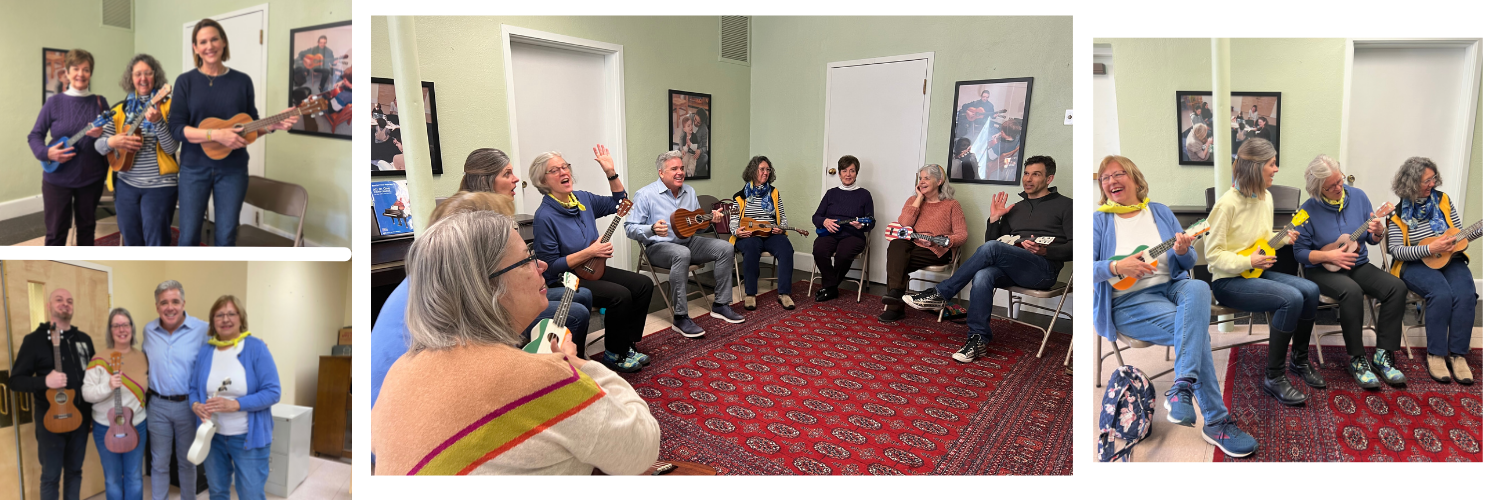
Watch our enthusiastic learners in action and hear our story on WCVB’s YouTube channel. You’ll see how much fun everyone had with the ukulele and why maybe you should pick it up too!
What could be more fun? If you would like to join in, there are two 8-week Ukulele Crash Courses to choose from 3:00 – 4:00 pm and 7:00 0 8:00 pm. Adults and teens welcome!
March Listening Project Playlist
Expand your music playlists and discover new genres while honing your active listening skills, and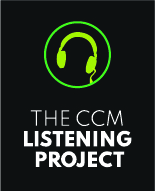 of course, have fun with music.
of course, have fun with music.
As we approach spring and the sun gets higher in the sky, there is a sense of optimism in the air. Stephen Marotto has tried to capture that feeling in some of the songs on this month’s playlist.
Take these shortcuts to your March playlist: YouTube or Spotify
Read background information and thought-provoking questions for each video and start thinking about music differently.
Keep a Listening Journal and then begin great discussions around the dinner table—make your family dinner special with music.
Welcome Brooke Sofferman to the CCM Faculty
If you looked up the definition of a multi-instrumentalist, we might expect to see Brooke  Sofferman’s name listed as a perfect example. Drums, piano, guitar, bass—he plays them all. Plus, he teaches voice and provides instruction for ensembles, theory, ear training, and composition.
Sofferman’s name listed as a perfect example. Drums, piano, guitar, bass—he plays them all. Plus, he teaches voice and provides instruction for ensembles, theory, ear training, and composition.
Jazz, classical, rock, and the blues—he loves to play, teach, and listen to them all. With such a wide-angle view of music, his repertoire also includes folk/Americana, reggae, funk, Latin, and World styles.
His mantra seems to be: Discover it all and let there be no boundaries when it comes to music genres.
That makes it easier for Brooke to treat every student as an individual with their own interests. Brooke says, “ I don’t use a cookie-cutter approach, not all students learn the same way, so it is my job to find the way that works for each particular student.”
Get to know CCM faculty member Brooke Soffferman
Welcome Alison Ruch to the CCM Board of Directors
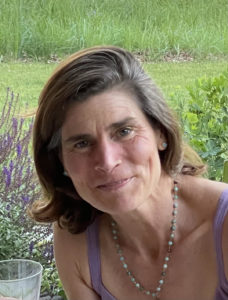 “Music has always been an essential part of my family’s life, specifically offering me inspiration, calm, a sense of accomplishment and joy. Lessons on and off throughout my life in piano, guitar, and singing, continue to provide me challenge and pleasure and bring me to a place of truly being present.
“Music has always been an essential part of my family’s life, specifically offering me inspiration, calm, a sense of accomplishment and joy. Lessons on and off throughout my life in piano, guitar, and singing, continue to provide me challenge and pleasure and bring me to a place of truly being present.
Scientific research into its healing powers fascinates me and is something about which I’m curious to learn more. Regardless of any studies, I am certain of its ability to uplift and soothe my mind, body, and spirit, as I have found from choral music at church, playlists for yoga, and unwinding at the end of the day.
The joys I have found through connections made while singing in choruses and attending shows and concerts with friends fills me with gratitude, one that is deepened even more so recently by the pleasure, focus and confidence my son is finding as a budding violinist.
I have recently come to appreciate that one does not need to have musical talent to find pleasure in and reap the benefits from music. It can reach everyone, and the myriad of offerings at CCM speaks to this beautifully. CCM is a gem of Concord, and it would be an absolute honor and pleasure to support the remarkable mission of CCM of continuing to bring the gift of music to our community and beyond.”
Are you a CCM friend yet?
Join us on Instagram and Facebook to be the first to learn CCM news and more! See what music videos we like, photos we post, practice tips and articles we suggest, and new music in the music world. Be sure to bookmark the CCM Blog to never miss a new post.

Proficiency on any one musical instrument can be difficult to achieve. So why would you compound that difficulty by taking on a second instrument? Or a third? Or even a fourth?
Because for some, the challenge of learning new instruments is a big part of music’s appeal. Writes guitarist Alon Cooper of Guitar Song Masters, “Expanding your own musical horizons further with more instruments is one of music’s biggest joys.”
In addition to guitar, Cooper plays seven other instruments ranging from African drums to trumpet. “On an average day I play my guitars for an hour or two, sit on the piano at least for a few songs, play around with the harmonicas, melodica, and the flute, and occasionally pull out the drums or the trumpet,” he writes. “I am seriously never bored and always having a blast.”
Too Much of a Good Thing?
OK, for the lucky few who have the aptitude, the resources, and the time, collecting a variety of instruments and learning to play them at a leisurely pace is nirvana. But for the average music student, or even most professional musicians, such broad multi-instrumentalism isn’t really a practical goal. Some seasoned musicians even caution against dabbling in other instruments until you’ve mastered your first, arguing that it’s a form of procrastination. Many of those who acknowledge the potential benefits of multi-instrumentalism seem compelled to list potential downsides as well. (A cursory Google search turns up multiple articles that address the topic in a “pros and cons” format.) 
Most of the objections offer a variation on the old “jack of all trades, master of none” theory. Writing on learnjazzstandards.com, guitarist Brent Vaartstra asserts that multi-instrumentalists seem to suffer from “a musical identity crisis.” By contrast, he adds, “Having a single-instrument identity implies some degree of expertise, be it legitimate or not.”
But to his credit, Vaartstra admits that there is no “right or wrong answer to whether or not to be a multi-instrumentalist,” and even adds that he sometimes feels jealous of his more versatile colleagues. “I’ve seen many multi-instrumentalists who are decent at several instruments snag gigs I could never get,” he writes.
That brings us to the second primary argument in favor of becoming a multi-instrumentalist. Beyond the fun it provides, it can also be profitable.
Multi-Instrumentalists Have Richer Résumés
Pianist Juan Rezzuto, writing on pianolessonslondon, explains the benefits of being a multi-instrumentalist in practical terms. “Playing multiple instruments well makes you a more employable musician,” he writes. Or, as Frederik Nielsen puts it on roadiemusic.com, “More instruments equal more money.”
That depends to some extent on where you are. In a rich musical melting pot like Boston, being a multi-instrumentalist won’t necessarily help you as a paid performer. Brooke Sofferman, an accomplished jazz percussionist, gets lots of calls to play drums around his home in New England. And although he also plays a variety of other instruments, including piano, he realizes that someone looking for a piano player “wouldn’t think of me over the 40 other people out there who play piano as their main instrument.”
And although he also plays a variety of other instruments, including piano, he realizes that someone looking for a piano player “wouldn’t think of me over the 40 other people out there who play piano as their main instrument.”
Still, you never know. And if you’re a guitarist, jazz trumpeter, or piano player who thinks that expanding your repertoire by, say, learning bass would amount to a step down — well, think again. It might even open doors you never dreamed of. Just ask Paul McCartney. He was already a multi-instrumentalist when the Beatles formed, and he drolly asserts that he and his left-handed Höfner 500 became famous only because “None of us wanted to be the bass player.”
Ever the pro, Sir Paul stepped in to fill the role. Suffice to say, that modest bass playing gig eventually gave him the opportunity to put the full range of his talent on display, sometimes playing every instrument on his recordings.
You don’t have to reach McCartney-level success to profit from your multi-instrumental skills. “With budgets shrinking, many [employers] are looking to hire as [few] people as possible,” Rezzuto writes. “So as a session musician, playing multiple instruments will get the musician more work whether it is live or in the studio.”
Proficiency on multiple instruments also opens the door to multiple teaching opportunities. “Are you a guitar teacher?” Nielsen writes. “Then you should consider branching out. Imagine how many students you could have if you learned to play more instruments.”
That’s what Sofferman has done. Although his opportunities as a live performer are mostly limited to drums, being a multi-instrumentalist has led to additional opportunities as a music educator. “It has definitely allowed me to be able to teach more things and have more work,” he says.
The Intangibles
But maybe the best argument for branching out beyond your core instrument is that it can make playing music a richer and more rewarding experience. Familiarity with different instruments is conducive to collaboration, for example. “When you understand more instruments,” Nielsen writes, “you’ll also understand your band better.”
Sofferman agrees. “Some of the best jazz saxophone players in the world are also great drummers,” he says. “They wanted to connect with the rhythmic side of their playing and they are able to access that by playing the drums.”
Cooper says that in addition to providing a better understanding of music theory and rhythm, playing multiple instruments also sharpens your ear and improves dexterity. And he points out that becoming a multi-instrumentalist provides a benefit beyond improved musicianship: “Listening to music becomes a much deeper experience.”
In the end, it comes down to knowing yourself and your priorities as a musician. If you want to dedicate yourself to a single instrument, possibly in an effort to become a world-class player, that’s what you should do. If, on the other hand, you simply love music in all its forms, it makes sense to learn as many instruments as you can. “I can’t imagine a downside,” Sofferman says, “other than just not having enough hours in the day to practice every instrument you might want to play. Sometimes it would be nice to be an octopus.”
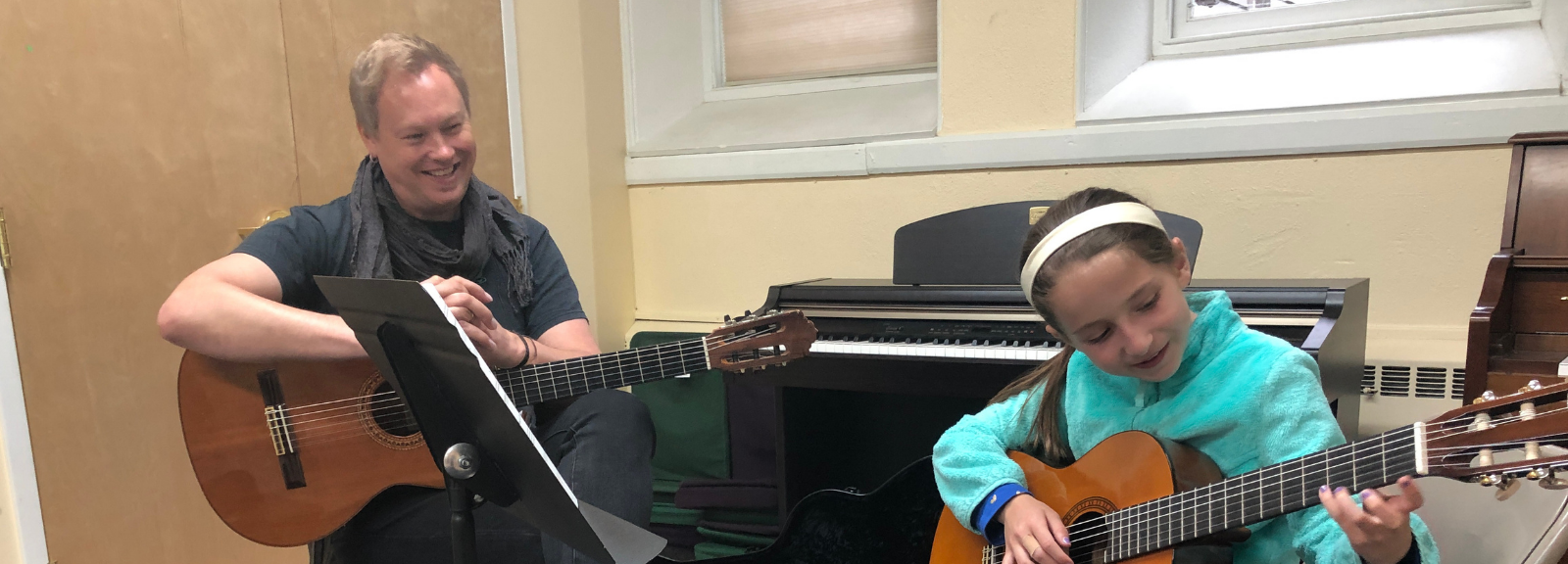
Imagine you were born outside Stockholm, Sweden and spurred by an early interest in rock guitar. How in the world could you find your way into Italian folk music? “Marry into it,” says Björn Wennås, Guitar Department Chair at CCM.
He’s joking. Sort of. But Björn’s entrée into the world of Italian folk music is also a wonderful illustration of the power that music education has to shape a life.
Lessons from the Old School
Despite his initial fixation on rock, Björn was schooled in classical guitar. His first teacher, Miroslav Simic, “pretty much shaped me into who I am today,” Björn says.
With a solid foundation in classical guitar, Björn received a BA from Uppsala, Sweden’s oldest university, before coming to the U.S. to continue his music education at Boston’s Berklee College of Music. Each year the school stages an international folk festival — and one such festival changed the course of Björn’s life.
A fellow international student, Italian vocalist, songwriter, and dancer Carmen Marsico, put together a band made up of students from her home country. One problem: There were no Italian guitar players available. “So they asked me,” Björn says. “One thing led to another, and we formed this band, Newpoli.”
A Sound Decision
The formation of Newpoli led to five albums of traditional Italian folk music liberally seasoned with Mediterranean influences, including Greece and Turkish grooves.
It also resulted in and one married couple. Björn and Carmen are now husband and wife. Theirs is a collaboration in every sense. They recently launched a band called Zafarán, with multi-instrumentalist Dan Meyers and percussionist Davide Roberto.
In addition, Björn plays with Ishna, a contemporary Irish folk band. And over the years he has expanded his range of fretted instruments to include the 10-stringed Chitarra Battente, becoming one of the few people outside Italy to play it.
Putting the Class in Classical
Björn’s openness to learning new music and new types of fretted instruments has made him a lifelong student — which in turn has informed his teaching.
That’s not always an easy transition. In fact, some musicians who reach a certain level of technical competency can have a difficult time connecting with those who are just starting out. “A lot of musicians who are great players can’t translate that to the classroom,” Björn says. “I think the reason is that when you’re teaching, you have to put yourself in the mind of pedagogy, of ‘How can I explain this?’ It takes years of experience.”
The key to becoming a great teacher, Björn says, is that “you have to find the right material. It has to suit you, and you have to know that material really well in order to teach it to a student.”
A good teacher keeps an ear open for pieces that illustrate particular lessons. “You just compile things over the years that you know will work,” Björn says.
Progress Reports
Over time Björn has honed his ability to assess a student’s progress — another critical teaching skill. “It’s important to recognize fairly quickly if a student has a problem so you can understand what you have to do to mitigate that problem,” Björn says.
In some cases, the solution is as simple as “moving a finger to the outside instead of straight on top. Little things like that can lead to an ‘Aha!’ moment and really open them up.” (Björn also says it’s extremely important for a beginning student to use a good-quality instrument. See below “Fretfulness: Don’t Hinder Your Student with a Substandard Guitar.”)
Lessons for Life
Becoming a more versatile guitarist has helped Björn become a better teacher — which, in turn, has helped him become an even more versatile guitarist. “No matter what level of teaching you do, you have to keep repeating a lot of basic lessons,” he says. “And I think that keeps those basic lessons fresh in your mind.”
That freshness keeps Björn open to new learning experiences. Zafarán, the new band he’s formed 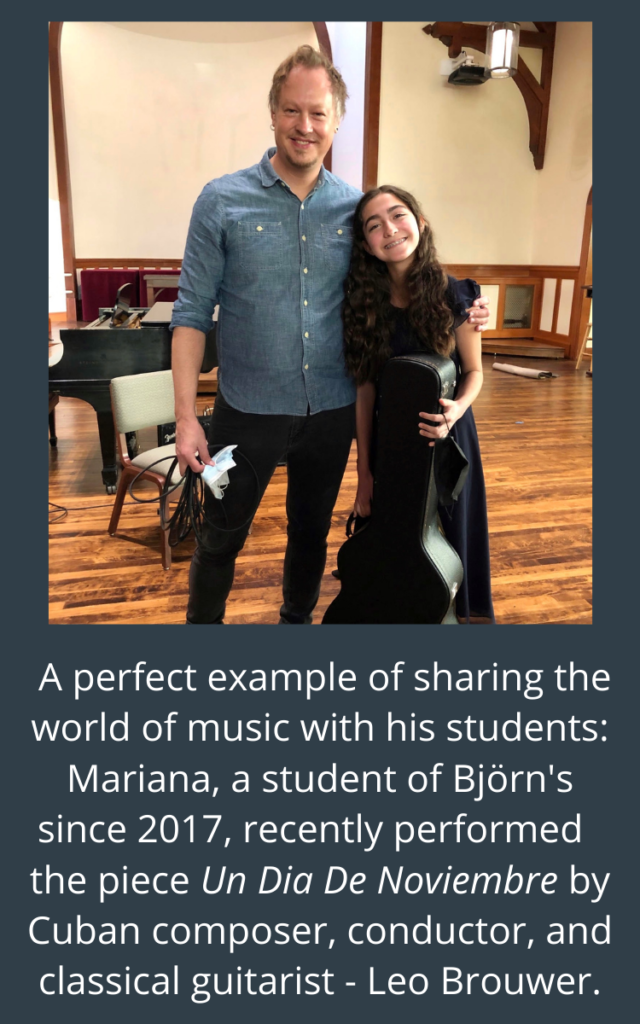 with Carmen, is a good example. The name is derived from the name of a pepper found only in Basilicata, a region in the south of Italy where Carmen is from. When ground, the pepper becomes a yellow-orange powder that resembles saffron — which led Arab traders to call it Zafarán.
with Carmen, is a good example. The name is derived from the name of a pepper found only in Basilicata, a region in the south of Italy where Carmen is from. When ground, the pepper becomes a yellow-orange powder that resembles saffron — which led Arab traders to call it Zafarán.
“That stayed in the dialect,” Björn says. “So we thought that was a cool theme — how different people look at the same thing and call it different things. And the same is true of music in that region. You can trace influences: ‘This is a song from the Balkans but you can hear a pattern from North Africa in there.’ When you know the history of the trade routes and things like that, you can start to make those connections.”
Making Connections — and Keeping Them
As Björn knows, connections made through music can leave profound impact on a person’s life. “It’s rewarding when I’ve been with a student for a long time and I can see how their interest and excitement over their instrument has grown,” Björn says. “Even if they don’t play professionally, it’s something they will always have in their lives. And you can see that what you did, what you taught them — it made a difference.”
That was confirmed recently when he and Carmen ran into a former student. “He took lessons from both of us,” Björn says. (Carmen is a vocal instructor.) “I almost didn’t recognize him because he has grown so much and has a beard now.”
But the former pupil made it clear that Björn and Carmen and had left a lasting impression. “When he introduced us to his girlfriend,” Björn recalls, “he said, ‘You see these two here? They shaped my childhood.’”
That’s the power of music education.
